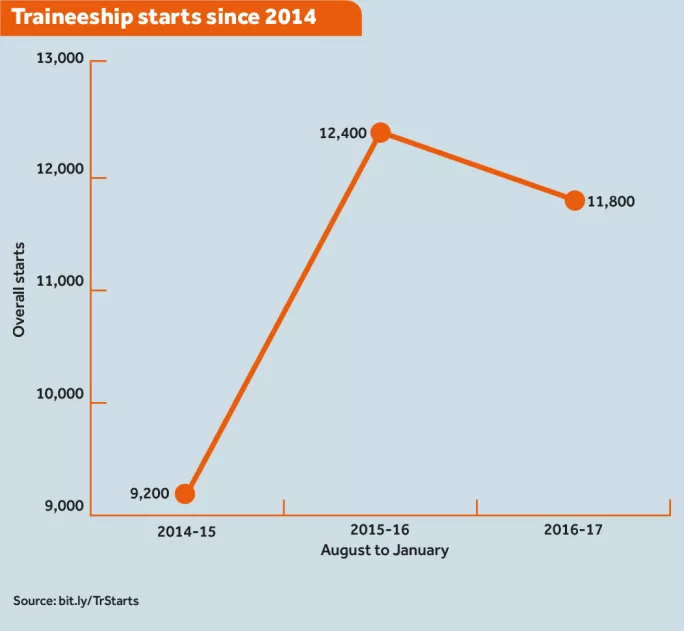
Trainee schemes: a ‘great idea’ in need of attention

An “official pre-apprenticeship trainee programme” is needed to prepare young people for the rigours of becoming an apprentice, according to the Labour Party’s general election manifesto.
Gordon Marsden, shadow minister for further and higher education, says too many young people who could benefit from an apprenticeship do not have the skills required. He says that a specialist programme is a “crucial” part of helping more young people into employment.
This is not a new idea. A similar programme already exists: it is called a traineeship. A pilot version was first mooted by Nick Clegg, who was deputy prime minister at the time, back in 2012. It would, he explained, be a “package of training and work experience to get the basic, necessary skills, with a recognised qualification at the end of it; an extra rung on the ladder to get you on your way to an apprenticeship or job.”
The programme proper was launched the following year amid great fanfare. Matthew Hancock, the skills minister at the time, proclaimed that it would be a “helping hand” for young people hoping to get on an apprenticeship and find a job.
The programme has not had the impact many envisaged, though. In fact, official data published this year reveals that the number of young people starting a traineeship actually dropped for the first time, with 600 fewer 18- to 24-year-olds embarking on the programme between August and January than in the same period 12 months earlier. Barely three years into the programme, its decline has been swift and alarming.

Apprenticeships sit at the centre of the country’s skills strategy, with a levy to fund the programme and an dedicated apprenticeships and skills minister to guide it. The mainstream political parties are falling over one another to be seen as the champions of the apprenticeship agenda. But traineeships remain widely ignored and lack secure funding, resulting in many providers refusing to deliver them at all.
At the same time, providers have raised concerns that restrictive rules on benefits mean many potential trainees are being deterred from traineeships by the risk of missing out on Jobseekers’ Allowance (JSA).
Many providers have also refused to offer traineeships because of concerns about how the programme is funded. In many cases, providers would be required to invest in additional staffing and infrastructure for traineeships with no guarantee that government funding would be forthcoming.
Part of the funding is also dependent on trainees progressing to an apprenticeship, job or further study within six months of completing the traineeship. This means there is a lag in providers receiving the funding - and, if learners do not find a positive outcome within the specified timeframe, providers will not receive the full amount of funding.
In 2015-16, there were 24,100 traineeship starts but only 17,400 completions, meaning providers were potentially left out of pocket for more than a quarter of trainees enrolled.
‘Very sluggish’
The traineeship programme was created to help young people who had not achieved a level 3 qualification to gain the skills and experience required for employment. The course was designed to last a maximum of six months - although students often take less time to complete it - and includes improving English and maths, a work experience placement and work preparation training such as CV-writing.
Since the programme was introduced in 2013, 65,700 young people have started a traineeship. But this pales into insignificance compared with the number of people embarking on apprenticeships: in just six months between August 2016 and January 2017, there were 258,800 apprenticeship starts.
According to Marsden, traineeships are a fine idea - in principle. “If we are to expand the number of quality apprenticeships, that we all want to expand...then we’ve got to be able to get a larger number of young people who, at the moment, don’t compete easily for those apprenticeships because of whatever’s happened to them at school,” he says.
But the MP for Blackpool South believes the main problem with traineeships is that they were introduced without sufficient incentives or marketing to entice FE providers to deliver them. “So, not surprisingly, it was very sluggish,” he adds.
Marsden says another reason traineeships have not taken off is owing to the 16-hour rule. Trainees are currently prevented from claiming Jobseeker’s Allowance if they undertake 16 or more hours of training a week.
“What’s happening is that lots of young people who might want to take traineeships are prevented from doing so because they lose their JSA, or [are] put off because it all sounds too complicated,” says Marsden.
And even though the programme has always been portrayed as a gateway qualification for students hoping to move onto an apprenticeship, traineeships have received far less attention. In the Post-16 Skills Plan, for example, the word “traineeship” appears three times, while the word “apprenticeship” appears 110 times. In the Conservative Party’s election manifesto, published last week, traineeships are not mentioned once.
Mark Dawe, chief executive of the Association of Employment and Learning Providers, says the drop in trainees is “disappointing” - but, with investment from government not guaranteed, eligible providers are in two minds about delivering the training.
“Traineeships are the epitome of social mobility, which is why providers are so keen to increase the number of opportunities available,” Dawe says. “But this requires investment and providers can’t afford the risk if there is no certainty on sustainable funding.
“The government must demonstrate similar enthusiasm to really make the programme fly. We need responsive growth funding and accurate measurement of success in respect of apprenticeships, jobs and further learning.”
According to Fleur Sexton, joint-managing director of independent training provider PET-Xi, the reason why some providers do not want to run the programme is because they “will always be working at a deficit”.
“In terms of the budget, you will always be working at a deficit on traineeships. You have to put in the hours, the care and attention and the staffing to truly make it work. To make the young person the centre and the heart of it, you are going to have to put on more staff than on paper you would need. They do need the extra care and attention.”
Penny Wycherley, principal of Waltham Forest College, says that despite the traineeships being a “great idea”, sympathetic employers are still required to run them.
“With some of the challenges that are going on around both apprenticeships and the Brexit challenge at the moment, I think that some employers are being a bit more wary than they were in the past,” she says.
You need a Tes subscription to read this article
Subscribe now to read this article and get other subscriber-only content:
- Unlimited access to all Tes magazine content
- Exclusive subscriber-only stories
- Award-winning email newsletters
- Unlimited access to all Tes magazine content
- Exclusive subscriber-only stories
- Award-winning email newsletters
You need a subscription to read this article
Subscribe now to read this article and get other subscriber-only content, including:
- Unlimited access to all Tes magazine content
- Exclusive subscriber-only stories
- Award-winning email newsletters
- Unlimited access to all Tes magazine content
- Exclusive subscriber-only stories
- Award-winning email newsletters